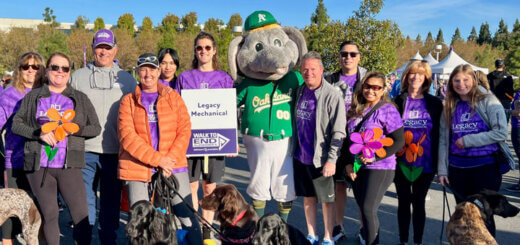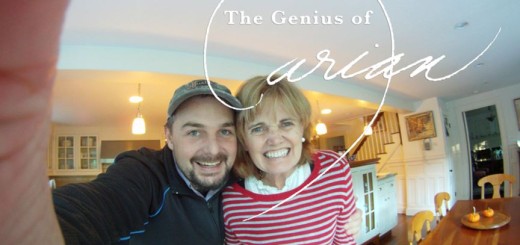Bringing Alzheimer’s out of the closet
Dr. Marcy Adelman’s experience caring for her mother and her concern for elders in the LGBTQ community led to her involvement with the Alzheimer’s Association. Both professionally and personally, Marcy is making a difference for families impacted by Alzheimer’s.
No diagnosis for Mom
Marcy’s mother, Julie, had a series of small strokes in 2000 and wasn’t getting better. While Marcy suspects that her mom had vascular dementia, Julie never received a diagnosis.
This lack of diagnosis was difficult for the entire family, especially for Marcy’s father, Ben. He was always positive with his beloved wife of 58 years.
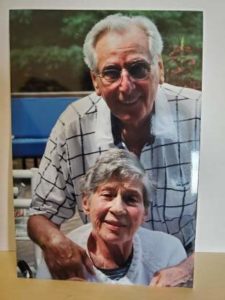
Ben never stopped encouraging and trying to motivate Julie. He wanted her to stay active and keep caring for herself.
Ben, who had recently retired, envisioned traveling with Julie. “He wanted to have that life together with her,” Marcy recalled, “but I saw it getting further away from them both.”
Without a diagnosis, Ben didn’t understand the progression of the disease. It was hard for him to come to terms with the changes in Julie.
Marcy witnessed many unnecessary trips to the emergency room. She also saw the emotional pain and stress her father experienced as a caregiver.
Dad’s dying
wish
In the summer of 2002 Ben suddenly became ill
and died. “His biggest wish before he passed,” Marcy shared, “was that we
keep Mom at home.”
His five children committed to fulfilling their father’s wish. After Ben passed, Marcy and her four siblings provided and managed their Mom’s 24/7 care.
The siblings took turns staying with their Mom and managing her daily care needs. Julie died peacefully in her home in 2007, surrounded by loving family and caring aids.
Marcy talks about her caregiving experience
Lessons learned
Her own family’s experience led Marcy, already an LGBTQ aging advocate, to become a dementia care advocate. “So many people don’t get a diagnosis,” Marcy said. “They should have the chance to enjoy life as much as they can, while they can.”
With an early diagnosis, the person living with Alzheimer’s and their caregivers can plan for the future and prepare for the personal challenges ahead. For people without a spouse or adult children, an early diagnosis offers time to build a care team and make financial, medical and legal plans.
Marcy’s personal experience as a caregiver also had a big impact on her. “It was a real eye opener to see how much it took to keep my Mom comfortable at home,” said Marcy. “I learned what it takes to take care of someone who has dementia. No one living with dementia or their caregiver should ever have to do it alone.”
San Francisco in the 1970s
Marcy feels fortunate to have lived in San Francisco during the gay liberation movement. She moved to San Francisco in the early 1970s to live an out life.
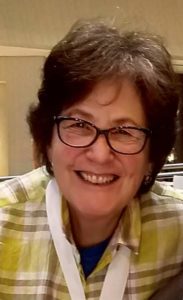
Having been very close to her grandmother growing up, Marcy noticed an absence of older adults in the community. “We were building an out community for the first time,” Marcy recalled. “I couldn’t help but wonder where our elders were and how to bring them into our lives.
“It set me on a journey that has lasted all my adult life. I wanted to live in a community that embraces every age and stage of life and that makes seniors central.”
Supporting LGBTQ elders
In 1998, Marcy founded Openhouse. This nonprofit provides LGBTQ welcoming affordable senior housing and health and wellness services to San Francisco Bay Area LGBTQ seniors.
Openhouse helps LGBTQ older adults overcome the unique challenges they face. It empowers LGBTQ seniors to improve their health and well-being.
LGBTQ older adults are more likely than heterosexuals to be single, live alone and not have children. Marcy wanted to use her family’s lessons to improve services for LGBTQ elders living with Alzheimer’s and other dementias.
“My mom had five adult children to help her,” said Marcy. “I was concerned about who would be there to care for LGBTQ older adults living with dementia.”
A focus on LGBTQ elders with dementia
In 2012, Marcy began to serve on the San Francisco LGBT Aging Policy Task Force. This gave her the opportunity to ensure that LGBTQ older adults living with dementia could access needed services and supports.
An earlier initiative of the San Francisco Department of Aging had led to a plan for addressing future needs for dementia services. San Francisco’s Strategy for Excellence in Dementia Care report was published in 2009.
The study reported that the LGBTQ community was significantly underserved when it came to dementia care. “The study results formed the foundation for my work on the Task Force,” shared Marcy. “It wasn’t a question of if the community was underserved, but rather what to do about it.”
The LGBT Aging Policy Task Force made recommendations in 2014 that led to the funding of a new San Francisco LGBT Dementia Care Project. This project is a collaboration among the Alzheimer’s Association, Openhouse and the Family Caregiver Alliance. Marcy continues to serve on the project’s Advisory Committee.
The project goal was to develop an LGBTQ senior, dementia competent training for first responders, health care professionals and agencies serving elders. Over the past three years, staff have conducted 85 trainings for over 1,500 professionals in a variety of fields.
“It has been a great partnership,” shared Marcy. “We are reducing barriers to care and increasing access by ensuring that dementia services are LGBTQ-welcoming and culturally competent.”
Connecting
with Alzheimer’s Association
While
working on the Task Force, Marcy had the chance to interview Alzheimer’s
Association staff. As Marcy participated in meetings with them, she learned
more about their work. As she saw the difference the organization was making,
she decided to get involved.
A year ago, Marcy joined the chapter Board of Directors. As part of the Diversity and Inclusion Committee, Marcy has been working to expand services for LGBTQ, Latino and African American communities.
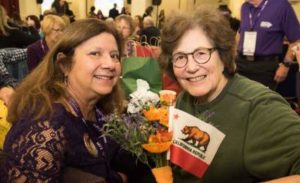
For several years, the Alzheimer’s Association has held a Latino Alzheimer’s Forum in San Jose. Caregivers from all over the Bay Area attend the free event to hear presentations in Spanish. Marcy and other board members have been exploring how to offer a similar event in San Francisco.
“Working with the Alzheimer’s Association has provided me an opportunity to work across communities in a way I haven’t before,” Marcy noted, “and I really appreciate that.” She finds it encouraging to see wider coalitions of groups working together on Alzheimer’s.
Hope for the future
Marcy acknowledges that there is more work to be done. The double stigma of being LGBTQ and having Alzheimer’s or another dementia may keep people from accessing services.
“People will not seek the help they need if they think they will be treated disrespectfully,” commented Marcy. “The lesson learned from the HIV/AIDS epidemic is that we need to bring Alzheimer’s and dementia out of the closet in the LGBTQ community.
“We need to insist we are treated with the dignity and respect we deserve. Programs such as the LGBT Dementia Care Project are doing just that. Still, we will need a wider network of community-based services to adequately respond to the needs of our community.”
Marcy’s efforts have already improved services for LGBTQ elders impacted by Alzheimer’s or related disorders. Marcy looks forward to continuing to work to increase awareness and reduce the stigma within the LGBTQ community.
Learn more:






